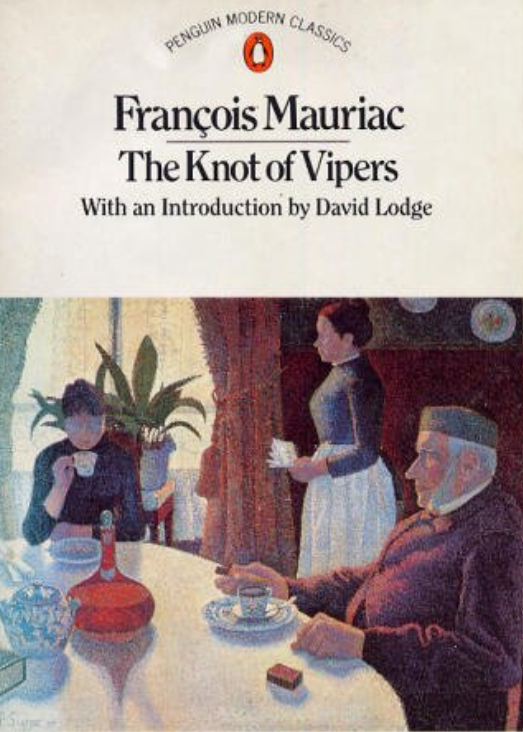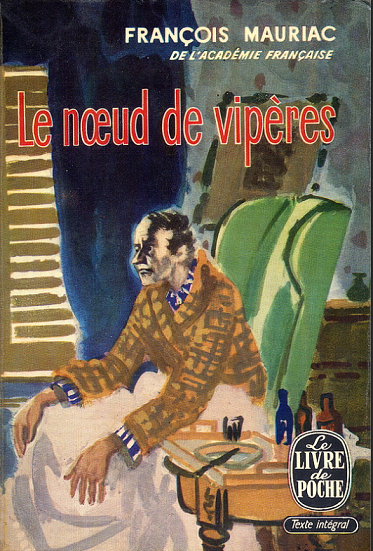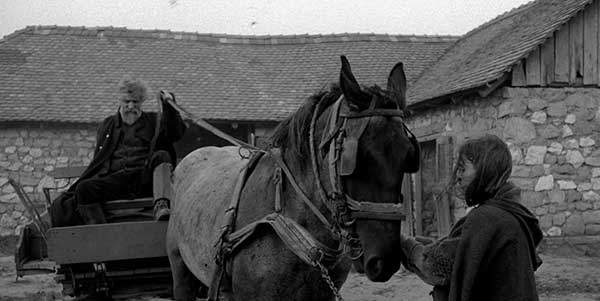I have been carrying forth through the novella ‘The Knot of Vipers’ by Francois Mauriac, unsure of where it is going. The novella is a final departure letter from an embittered husband, Louis, to his wife, an attempt to bring about retribution for a lifetime of her cruelty. Inferior due to breeding, Louis, in his esteem, suffered through a lonely childhood as an outcast, the only child of a loving widow—his parents peasant farmers. Yet in reality, his parents were responsible intelligent people who handled their property wisely, investing properly, providing him with a life of abundance. His upbringing established discipline, direction, and the means for Louis to mature into a highly successful lawyer. His determined shrewdness assured his surpassing of his wife’s upper class family linage in terms of wealth. His hard-earned wealth provided him with the means to tyrannize his family. Ferocious in nature, Louis is strict and unforgiving with everyone, including himself. He perceives himself to have suffered through a loveless marriage with a cold manipulating wife, his miserable fate announcing itself a fateful night in the very beginning of their marriage. His wife could never love him because she loved another. Yet, also the mastery of the novel, as Louis provides details in the writing of his letter, or diary, it is obvious he was cheating on his wife, Isa, at this time. As he writes, Isa’s prejudiced deplorableness fades. The further I read him write his letter to right all the wrongs he suffered, I identify Louis’ faults. In truth, the good guy/bad guy thing is a grey area. A highly critical atheist, his attacks and scheming upon his wife, children and their loved ones, in addition to his illegitimate son—one of his perpetual affairs—never ceases. In fact, his deviousness and cleverness in plotting against his family has become his only purpose for living–that and the writing of the letter. Determined, he is obsessed with the condition that his totalitarianism must reign after his death. Yet as he writes the letter something is happening to him. The knot of vipers that he describes as having a hold of his heart are being removed. At least that is my interpretation. The end is yet to be revealed. The section I first quote is him exploring his nephew Luc, one of the two children he loves. The children he loves died young. The other is his daughter Marie who died slowly as a young girl from disease. His living children he despises. The children he loves are from the past and gone. One wonders how much romanticism he attaches to them. Luc is the son of Marinette, his wife’s sister. Marinette married a much older man as a young woman in her twenties. Widowed before thirty, her deceased husband willed her a fortune under the conditions she could not remarry. If she remarried, she would be stripped of the fortune. The free-spirited Marinette moves in with Louis and Isa. Everyone is staunch in protecting, influencing, and ensuring that Marinette abides by the conditions of her fortune. Louis takes to riding horses with her, countering her foolish bantering about money meaning nothing. Louis admits he sees the loss of the fortune as a personal matter. He identifies her fortune as his. Marinette ends up running off with a journalist, marrying him, losing the fortune, and giving birth to Luc. She will die when Luc is young. Luc’s father will remarry and abandon him for the most part. Louis and Isa shoulder the burden of ensuring Luc receives a decent upbringing. Reflection upon Luc brings forth something missing in Louis. Notice he even says something kind about his son Hubert while immersed within thoughts of Luc. In all other accounts, his sentiments toward Hubert border on violence. The final two quotes are wonderful turnings of the tide—Louis opening up to the humanity and imperfections of his wife.
He (Luc) invariably looked me straight in the face. There was nothing shifty about his eyes. He wasn’t frightened of me: the idea of being frightened of me never entered his head. If I happened to come home unexpectedly after a few days’ absence, and caught the smell of cigar smoke in the house, or found the carpet up in the drawing-room with all the signs of a hastily interrupted party (I had only to turn my back for Geneviève and Hubert to provoke an “invasion”-in spite of my strict injunctions to the contrary-and you always aided and abetted their disobedience, because, you said, “one must return hospitality”), it was invariably Luc they sent to make their peace with me. The terror I inspired just made him laugh…
That boy was the only person in the world I couldn’t scare. Sometimes, when he set off on a day’s fishing, I used to go down to the river with him. Usually, he could never keep still, was forever dashing about here, there and everywhere, but on those occasions he was capable of standing perfectly motionless for hours on end, all eyes. It was exactly as though he had been turned into a tree: the slow, noiseless movements of his arm were like that of a swaying branch. Geneviève was perfectly right when she said that he would never be “literary”. He couldn’t be bothered to go out on the terrace at night to look at the moon. He was entirely without a feeling for nature, because he was nature, was wholly absorbed into it, was one of its forces, a living spring among its many springs.
I used to think of all the drama his young life had known-a dead mother, a father who was never mentioned in our presence, a lonely life in a remote school. Much less than all that would I have sufficed to fill me with bitterness and hate. Everybody loved him, and that seemed strange to me, whom everybody loathed. Yes, everybody loved him-even I. He had a smile for all, including me-but not more for me than for the others.
His nature was purely instinctive, and what struck me more and more, as he grew older, was his purity, his unawareness of evil, his utter disregard of it. I don’t mean to imply that our children weren’t “good”. Hubert, as you always said, was a model youth. In that respect, I must admit, your early training had borne fruit. I wonder whether, if Luc had lived into manhood, he would have remained so utterly untroubled. I never got the impression that, with him, purity was something he had been taught, something of which he was conscious. It had the limpid quality of water running over a stony bed. It glittered on him like the dew on grass. I dwell on this because it had a profound effect on me. Your parade of high principles, your hints, your expression of distaste, your pursed lips-these things never made me so truly aware of evil as did that boy, though I was not conscious of it at the time, nor for many years afterwards. If, as you hold, humanity carries in its flesh the stigma of original sin, then, all I can say is that no living eye can ever have seen the mark in Luc. He had come from the hand of the potter uncracked and lovely. I felt myself, in comparison with him, deformed.
Is it accurate to say that I loved him like my own son? No, because what I loved in him was that complete absence of all trace of myself. I know only too well what of myself I have bequeathed to Hubert and Geneviève-sharpness of temper, the exorbitant value which they attach to material things, and a certain violence of contempt…I could always feel quite sure that I should never bump up against myself in Luc.
************************************
She (Isa) was walking with the gait of those to whom walking is painful. I could almost hear her groaning, “Oh, my poor legs!” Husbands and wives of long standing never hate one another as much as they think they do.
**********************************
I stared at the vines and said nothing. I was a prey to sudden doubt. Is it possible that a man can live for nearly half a century noticing one side only of the person who shares his life? Can it be that, from long habit, he picks and chooses from among her gestures and her words, keeping for use only those that feed his grievances and perpetuate his resentments? There is a fatal tendency in all of us to simplify others, to eliminate in them everything that might soften the indictment, give some human lineaments to the caricature which our hatred craves in order to justify itself….






Recent Comments